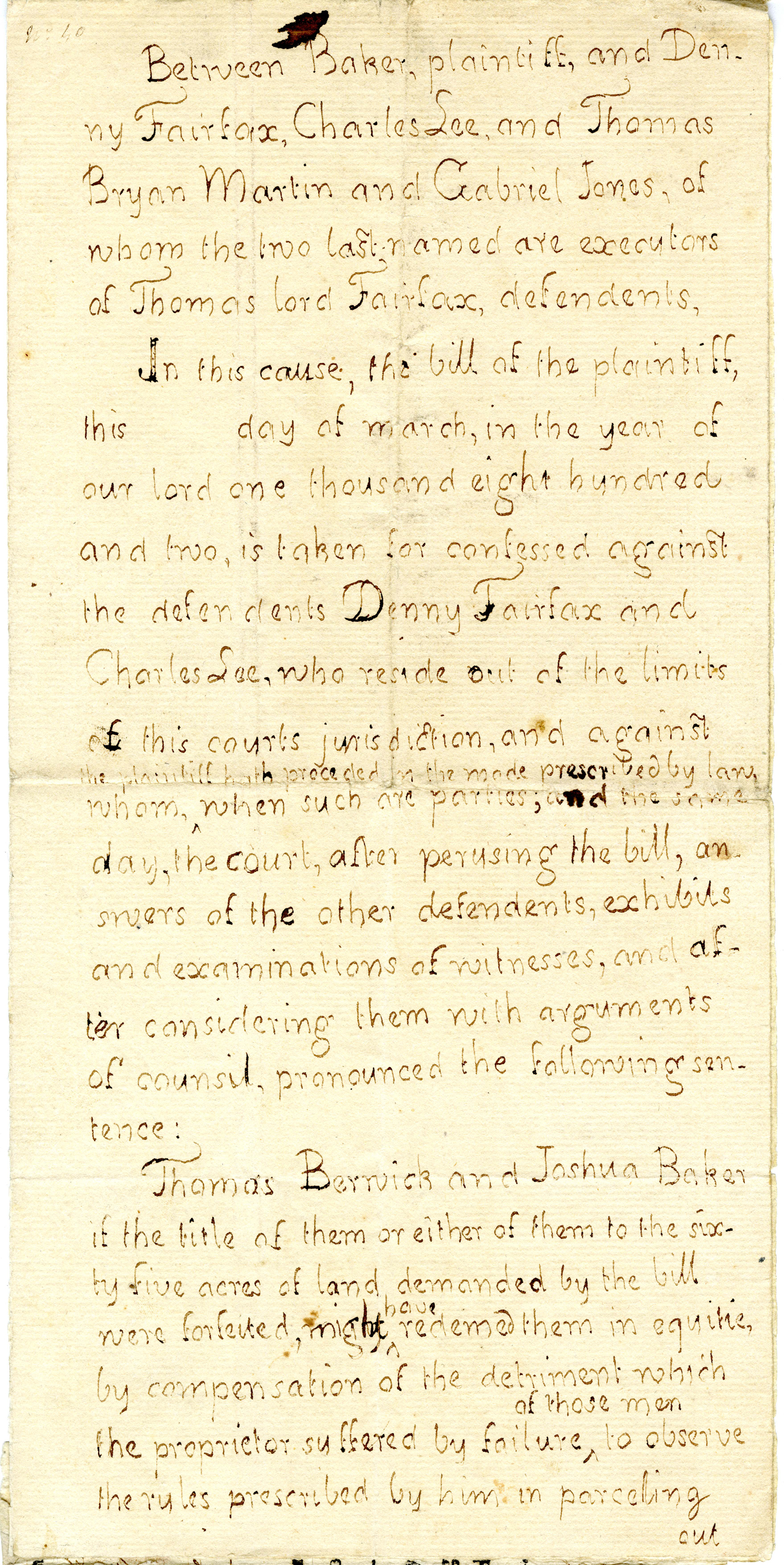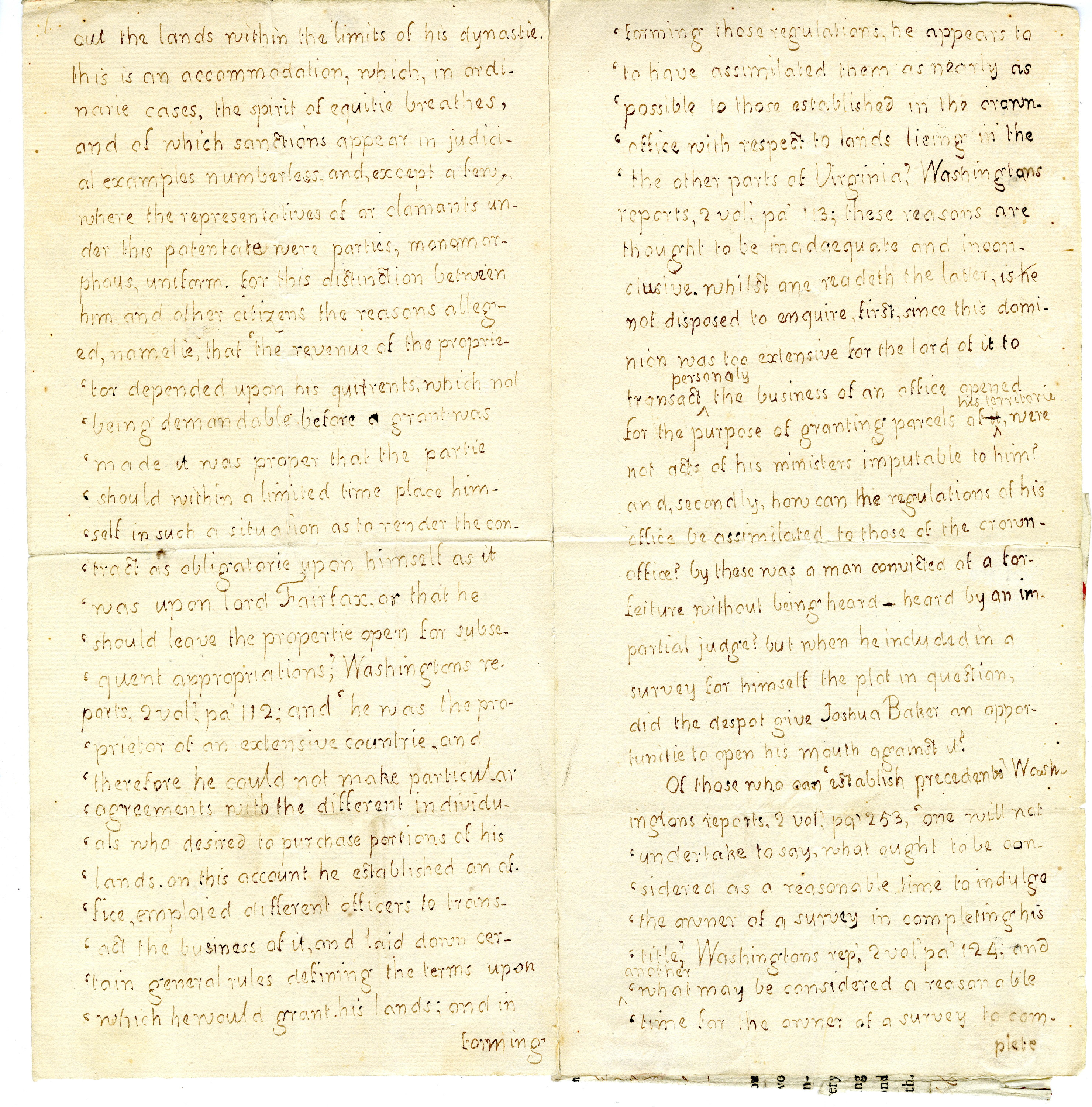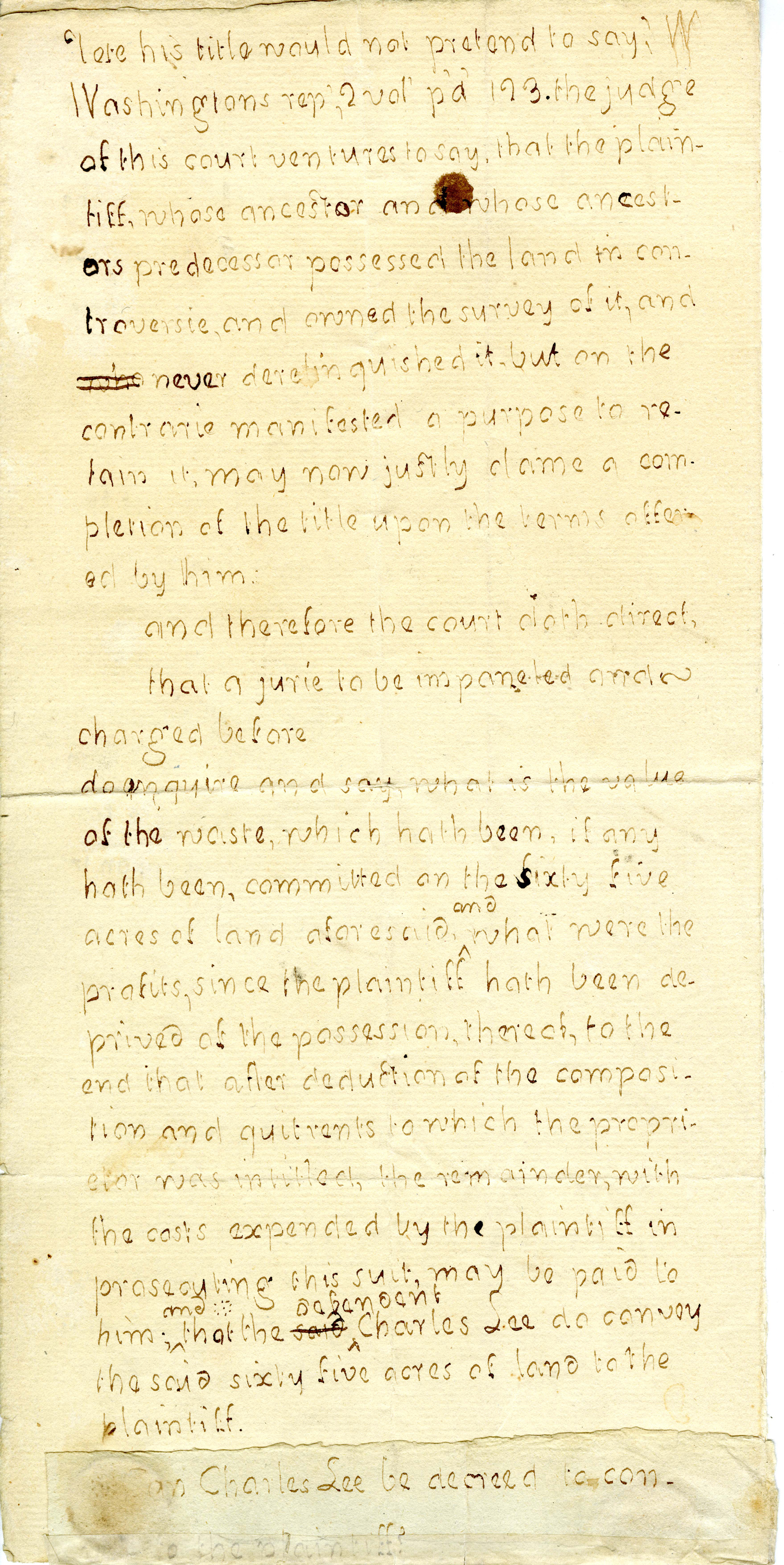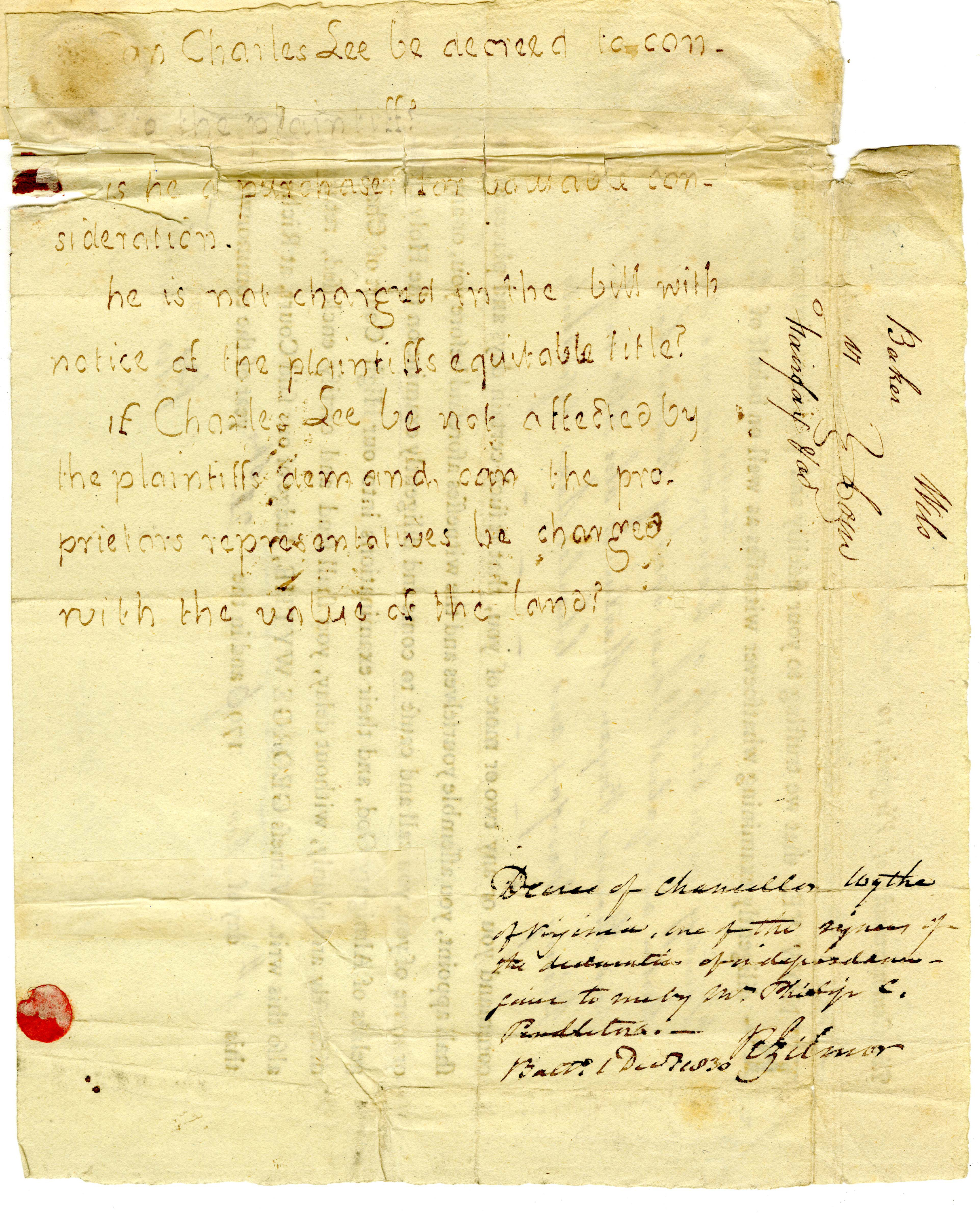Difference between revisions of "Decree in Baker v. Fairfax"
(→Page 1) |
(→Page 1) |
||
| Line 6: | Line 6: | ||
<blockquote> | <blockquote> | ||
| − | Between Baker, plaintiff, and Denny Fairfax, Charles Lee, and Thomas Bryan Martin and Gabriel Jones, of whom the two last named are executors of Thomas lord Fairfax, defendents, In this cause, the bill of the plaintiff, this | + | Between Baker, plaintiff, and Denny Fairfax, Charles Lee, and Thomas Bryan Martin and Gabriel Jones, of whom the two last named are executors of Thomas lord Fairfax, defendents, In this cause, the bill of the plaintiff, this day of march, in the year of our lord one thousand eight hundred and two, is taken for confessed against the defendents Denny Fairfax and Charles Lee, who reside out of the limits of this courts jurisdiction, and against the plaintiff hath proceded in the mode prescribed by law. Whom,^ when such are parties; and the same day, the court, after perusing the bill, answers of the other defendents, exhibits and examinations of witnesses, and after considering them with arguments of counsil, pronounced the following sentence: Thomas Berrvick and Joshua Baker in the title of them or either of them to the six-ty five acres of land demanded by the bill were forfeited, might^<sup>have</sup> redemed them in equitie, by compensation of the detriment which the proprietor suffered by failure^<sup>of those men</sup> to observe the rules prescribed by him in parceling out |
</blockquote> | </blockquote> | ||
Revision as of 15:22, 14 September 2016

Wythe's decree from March, 1802 in the case of Baker v. Fairfax.[1]
Contents
Document text, March 1802
Page 1
Between Baker, plaintiff, and Denny Fairfax, Charles Lee, and Thomas Bryan Martin and Gabriel Jones, of whom the two last named are executors of Thomas lord Fairfax, defendents, In this cause, the bill of the plaintiff, this day of march, in the year of our lord one thousand eight hundred and two, is taken for confessed against the defendents Denny Fairfax and Charles Lee, who reside out of the limits of this courts jurisdiction, and against the plaintiff hath proceded in the mode prescribed by law. Whom,^ when such are parties; and the same day, the court, after perusing the bill, answers of the other defendents, exhibits and examinations of witnesses, and after considering them with arguments of counsil, pronounced the following sentence: Thomas Berrvick and Joshua Baker in the title of them or either of them to the six-ty five acres of land demanded by the bill were forfeited, might^have redemed them in equitie, by compensation of the detriment which the proprietor suffered by failure^of those men to observe the rules prescribed by him in parceling out
Page 2

Page 3
forming these regulations, he appears to to have assimilated them as nearly as possible to those established in the crown-office with respect to lands lieing in the the other parts of Virginia? Washingtons reports, 2vol:pa' 113; these reasons are thought to be inadequate and incon-clusive. whilst one readeth the latter, is he not disposed to enquire, first, since this domi-nion was too extensive for the lord of it to transact^personaly the business of an office opened for the purpose of granting parcels of
it^his territorie, were not acts of his ministers imputable to him? and, secondly, how can the regulations of his office be assimilated to those of the crown-office? by these was a man convicted of a for-feiture without being heard _ heard by an impartial judge? but when he included in a survey for himself the plot in question, did the despot give Joshua Baker an oppor-tunitie to open his mouth against it? Of those who can establish precedential Wash-ingtons reports, 2vol:pa253, one will not undertake to say, what ought to be con-sidered as a reasonable time to indulge the owner of a survey in completing his title; Washingtons rep. 2vol'pa'124; and what may be considered a reasonable time for the owner of a survey to com-plete
Page 4

'lete his title would not pretend to say; Washingtons rep:2vol'p'a' 123. the judge of this court ventures to say, that the plain-tiff, whose ancestor and whose ancest-ors predecessor possessed the land in con-troversie, and owned the survey of it, and
whonever derelinquished it. but on the contrarie manifested a purpose to re-tain it, may now justly clame a com-pletion of the title upon the berms offered by him. and therefore the court doth direct, that a jurie to be impaneled and charged before do inquire and say, what is the value of the waste, which hath been, if any hath been, committed on the sixty five acres of land aforesaid, ^and what were the profits, since the plaintiff hath been de-prived of the possession, thereof, to the end that after deduction of the composi-tion and quitrents to which the propri-etor was entitled, the remainder, with the costs expended by the plaintiff in prosecuting this suit, may be paid to him; ^and that thesaid^defendent Charles Lee do convey the said sixty five acres of land to the plaintiff. Can Charles Lee be decreed to con-[sider] to the plaintiff?
Page 5

Can Charles Lee be decreed to con-[sider] to the plaintiff?
is he a purchaser for payable con-sideration. he is not charged in the bill with notice of the plaintiffs equitable title? if Charles Lee be not affected by the plaintiffs demand, can the pro-prietors representatives be charged with the value of the land?
Decree of Chancellor Wythe of Virginia, one of the
See also
Commission to Take Depositions, 9 November 1796
References
- ↑ "Decision of George Wythe in a lawsuit, November 9, 1796." Charles Roberts Autograph Letters Collection, Quaker & Special Collections, Haverford College, Haverford, Pennsylvania.